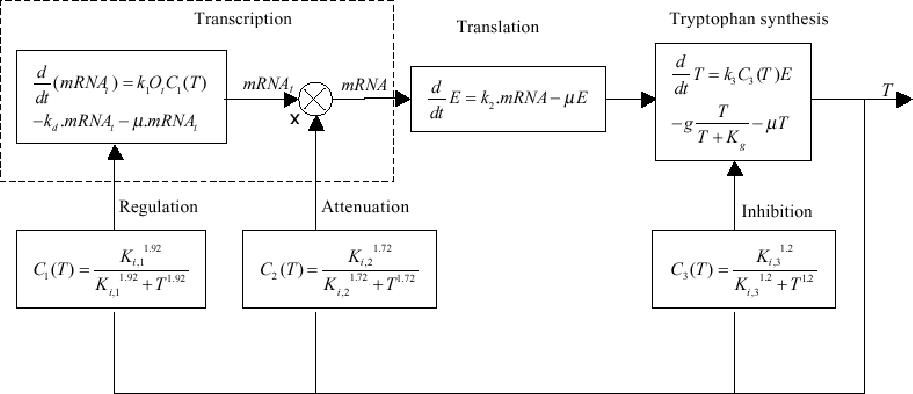Prof. Sharad Bhartiya Research Group IIT Bombay
Automation Lab
Tryptophan System
- Details
Tryptophan System (with Prof. K.V. Venkatesh)
 Biological systems respond appropriately to a variety of environments representing complex systems with rich physiological behavior. Quantitative models can be used to identify the design components that result in the system complexity. In this work, we have represented the tryptophan system by a reduced model which, however, highlights the regulatory motif. The tryptophan can be conceived of processes in series with a uniqe regulation at three distinct points using a single measurement. This multiple feedback loop motif enables the system to rapidly synthesize tryptophan when faced with severe starvation to a sluggish shut off of the system when exposed to a medium replete with tryptophan. Our analysis also shows that enzyme inhibition does not play a role under severe starvation and plays a marginal role in increasing the rate of repression when the cells are exposed to well-fed conditions. Furthermore, the multiple feedback loop system is robust to parametric variations relative to a mutated single feedback loop system. A system level analysis shows that the beneficial properties of the tryptophan system are a result of the regulatory design and can be preserved over systems of engineering interest such as control of level or pH in tanks in series system
Biological systems respond appropriately to a variety of environments representing complex systems with rich physiological behavior. Quantitative models can be used to identify the design components that result in the system complexity. In this work, we have represented the tryptophan system by a reduced model which, however, highlights the regulatory motif. The tryptophan can be conceived of processes in series with a uniqe regulation at three distinct points using a single measurement. This multiple feedback loop motif enables the system to rapidly synthesize tryptophan when faced with severe starvation to a sluggish shut off of the system when exposed to a medium replete with tryptophan. Our analysis also shows that enzyme inhibition does not play a role under severe starvation and plays a marginal role in increasing the rate of repression when the cells are exposed to well-fed conditions. Furthermore, the multiple feedback loop system is robust to parametric variations relative to a mutated single feedback loop system. A system level analysis shows that the beneficial properties of the tryptophan system are a result of the regulatory design and can be preserved over systems of engineering interest such as control of level or pH in tanks in series system

